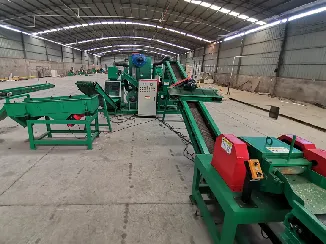

دسمبر . 11, 2024 18:43 Back to list
The Importance of Steel Scrap Processing Plants
In the contemporary world, where sustainability and resource conservation have become paramount, steel scrap processing plants play a crucial role. These facilities are engineered to recycle steel scrap, reduce the demand for new raw materials, and mitigate greenhouse gas emissions associated with steel production. As the construction and manufacturing industries continue to grow, the significance of steel scrap processing has never been clearer.
What is Steel Scrap?
Steel scrap is generated from manufacturing processes, construction sites, and the end-of-life phase of steel products. This can include leftover materials from factories, discarded steel products like old vehicles and appliances, and debris from construction and demolition activities. The generation of steel scrap not only poses a waste management challenge but also presents a golden opportunity for recycling.
The Process of Steel Scrap Processing
The processing of steel scrap involves several stages, each critical to ensuring that steel can be efficiently recycled. The initial phase begins with the collection of scrap material, which comes from various sources. Once gathered, the scrap metal is sorted to separate ferrous materials (iron-containing steel) from non-ferrous metals and other contaminants. This sorting process is vital as it ensures that only high-quality steel is reintroduced into the recycling loop.
Next, the sorted scrap is shredded into smaller pieces. Shredding makes it easier to transport and further processes the metal. Once shredded, the scrap can undergo additional cleaning processes, such as magnetic separation, to remove any remaining impurities. After cleaning, the steel fragments are melted down in electric arc furnaces, where they are melted at high temperatures. This molten steel can then be poured into molds to create new steel products or rolled into sheets and coils.
Environmental Benefits

The recycling of steel scrap is environmentally beneficial for several reasons. First, it conserves natural resources. Producing new steel from iron ore requires significant amounts of energy and water. In contrast, recycling steel scrap uses 75% less energy than producing steel from virgin ore. This energy reduction translates to fewer carbon emissions, helping to combat climate change.
Second, steel recycling conserves landfill space. Landfills are becoming increasingly crowded, and diverting scrap steel from these sites helps to reduce waste and minimize environmental impact. Not only does recycling scrap lessen the burden on landfills, but it also decreases the need for mining new materials, which can disrupt ecosystems.
Economic Advantages
Besides environmental benefits, steel scrap processing plants also contribute significantly to the economy. The recycling industry generates numerous jobs, from collection and transportation to processing and distribution. Moreover, by utilizing recycled materials, companies can reduce costs associated with new raw materials. When steel is recycled, it can be reintegrated into the production chain, leading to lower prices for manufacturers and consumers alike.
Additionally, the global demand for recycled steel continues to rise. As countries strive for sustainability, the market value for recycled steel is expected to increase, making it an attractive option for investors and businesses.
Conclusion
In conclusion, steel scrap processing plants are vital components of a sustainable economy. They not only support environmental conservation and resource management but also bolster the economy through job creation and cost savings. With the continuous advancements in recycling technologies and growing awareness of environmental issues, the future of steel scrap processing looks promising. As industries continue to evolve toward more sustainable practices, the role of steel scrap processing plants will undoubtedly become more prominent, paving the way for a greener future. By investing in and supporting these facilities, we take significant strides toward a more sustainable and responsible approach to steel production and consumption.
Latest news
Troubleshooting Common Eddy Separator Problems
NewsJul.04,2025
The Role of Metal Recycling Plants in Circular Economy
NewsJul.04,2025
The Impact of Recycling Line Pickers on Waste Management Costs
NewsJul.04,2025
Safety Features Every Metal Shredder Should Have
NewsJul.04,2025
How Industrial Shredders Improve Waste Management Systems
NewsJul.04,2025
How Cable Granulators Contribute to Sustainable Recycling
NewsJul.04,2025